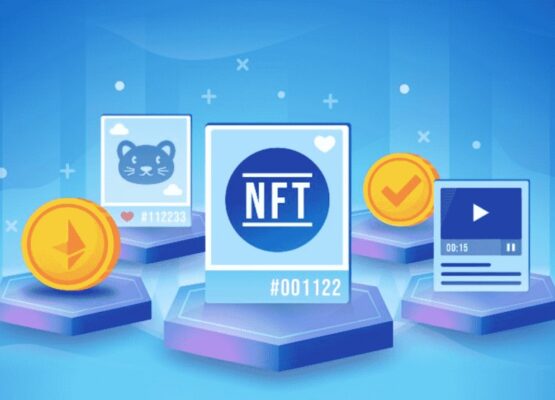Cryptocurrencies are a new form of decentralized digital currency built on top of existing encryption technologies. The use of encryption techniques makes cryptocurrencies useful as a medium of exchange and a form of virtual accounting. You’ll need a cryptocurrency wallet if you want to put any digital currency to use.
Additionally, it can be thought of as an encrypted string of data representing a monetary unit. A distributed database called a blockchain keeps track of all the purchases, sales, and transfers that take place in the system.
Tokens that can’t be exchanged for other tokens are called non-fungible tokens (NFTs), and they’re typically developed with the same code that’s used to make cryptocurrencies. These digital assets use blockchain technology, which is a distributed ledger. They can’t be traded or exchanged like other cryptocurrencies, unfortunately in the same vein as cryptocurrencies like Bitcoin and Ethereum.
Crypto Transformation in Real Estate
Value fluctuations in cryptocurrencies can be disruptive, but this doesn’t stop people from seeing them as the currency of the future.
Even though the widespread use of cryptocurrencies and blockchain technologies is still in its infancy, it will soon dominate our daily lives. You’ll want to be ahead of the curve if you’re interested in or invested in real estate technology.
Below listed are the four ways to prepare for the crypto real estate revolution:
1) Accept and send Payments using Crypto
As our lives become increasingly digitized, conducting business online will become the norm. People will therefore seek an additional safeguard for their liquid assets against the possibility of financial institution fraud.
Your assets and the recipient’s identity will be protected when you accept and send payments using cryptocurrency. Moreover, you’ll have a leg up on the competition if and when crypto becomes the norm.
2) Embracing Proptech World
Proptech’s greatest strength is that it can work in tandem with other technologies. Internet access is not a requirement for use of cloud-based proptech gadgets like smart locks and video intercoms.
Also, most of the information stored on these gadgets can be transferred to a blockchain in a matter of minutes. All proptech data and workflows will be encrypted and stored safely in blockchains, and nearly all building operations will take place in the cloud in a crypto-equipped building infrastructure.
3) Diversify your Portfolio
A real estate portfolio can be diversified in several ways.
One strategy is to invest in a few units of cryptocurrency, which can yield a high return that can be used for other purposes, such as purchasing a plot of land in the metaverse. Real estate cryptocurrency coins, or “tokens,” are gaining popularity because they can be used to buy actual properties.
Buying metaverse properties is another way to fully immerse yourself in the world of virtual currencies and real estate. Real estate developers and investors are using metaverse platforms to learn about emerging market trends in real-time before making any actual investments.
4) Process Property Transfers with Smart Contracts
Perhaps the most crucial features of blockchain and cryptocurrencies are their ability to automate processes and make information publicly available.
In addition to facilitating financial transactions, smart contracts built on the blockchain can be used to expedite the creation and processing of a wide variety of legal documents, including listing agreements, letters of intent, and offer documents. And because blockchain transactions are recorded in a public digital ledger, everything can be seen by anyone with internet access.
How can NFTs impact Physical Real Estate?
Every industry that has adopted NFTs have felt the effects, and the real estate market is no different. The benefits are enormous and ground-breaking, but understanding the terminology and mechanics can be challenging.
Some of the effects of NFTs on real estate are listed below:
- Blockchain’s permanent ledger is a major benefit. This document can never be altered, and anyone can view it at any time. They can be set up to track data that is crucial to the real estate industry using NFTs. A purchase of a land NFT, for instance, would be recorded instantly on the blockchain.
- Fast, secure, and inexpensive blockchain transactions are what makes this technology so attractive. You could complete secure real estate transactions in a matter of minutes using the same technology that powers NFTs. The conventional business method can take several days, weeks, or even months to complete.
- User interaction with real estate NFTs is transformed by smart contracts. The NFT’s smart contracts are the internal systems that provide instructions for when to take action. When you sell your NFT to another party, the resulting transaction is carried out by a smart contract.
- It would be possible for multiple people, similar to how real estate is typically owned. When several people are interested in purchasing a property but don’t have enough money to do so individually, co-ownership may be the best option. Or where a real estate developer needs additional funding to complete a project and solicits contributions from others to do so.
Also learn in detail about other topics including web3 real estate solutions, and real estate transactions using blockchain.
Effects of NFTs on Real Estate
Like cryptocurrencies, NFTs are a byproduct of blockchain technology; however, unlike cryptocurrencies, NFTs cannot be exchanged for other NFTs. All NFTs on Ethereum must be compatible with the ERC-721 standard and be created by means of smart contracts. To ensure that no two NFTs have the same value, these smart contracts generate a one-of-a-kind hash code for each one.
The hash code always reveals the true owner of an NFT, so there can be only one. Features like these are put to use in the LiquidEarth NFT property exchange.
Real estate can be bought and sold instantly on the platform using a variety of cryptocurrencies such as USDC, Ethereum, Algorand, Avalanche, and others. This streamlines and quickens the entire real estate transaction. Additionally, buyers who were once limited to purchasing real estate within their geographic area can now easily buy properties anywhere in the world. The team at LiquidEarth hopes that by issuing NFTs backed by real estate, they can bring over $100 billion into the cryptocurrency markets.
The purchase and sale of real estate conducted via NFTs are, in the long run, more financially and ecologically sound for both buyers and sellers. The purchase of real estate through LiquidEarth can result in savings of up to 4% of the property’s value due to the use of NFTs.
Final Thoughts
These days, cryptocurrency and blockchain are influencing every sector of the economy, from finance to healthcare. Nevertheless, one of the most talked-about uses for blockchain thus far has been in the real estate industry.
Blockchain technology has the potential to improve every facet of the real estate industry, including the renting and selling of apartments, the buying and selling of land, and the construction and sale of home improvements. Take advantage of the situation now, because using cryptocurrency to purchase real estate will soon be commonplace.



